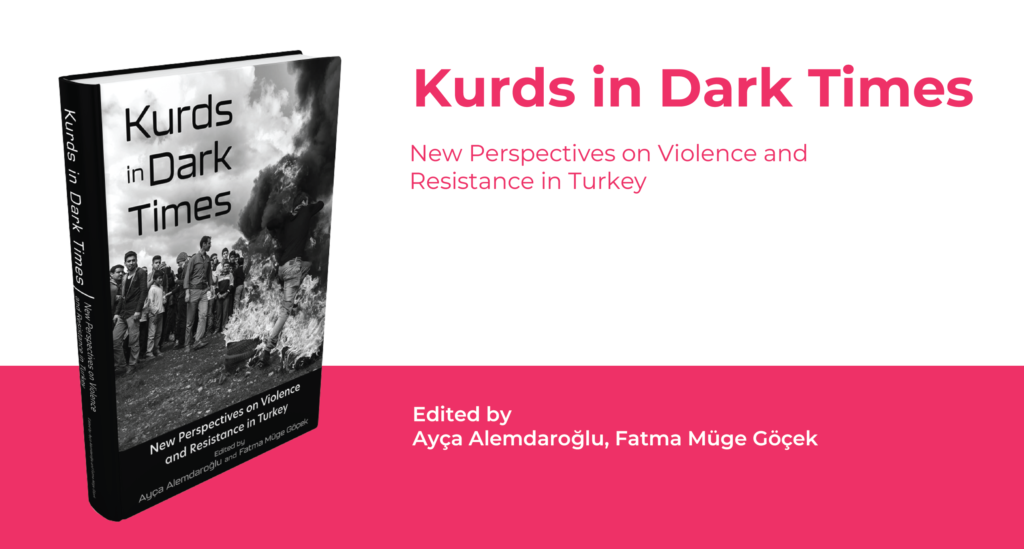
The Long Twentieth Century Of Kurds And Kurdistan
Kurds in Dark Times
Edited by Ayça Alemdaroglu, Fatma Müge Göçek
Afterword by Hamit Bozarslan
Acknowledgments
This book is built collaboration that began in 2016 at the Historical and Comparatives on Kurdish Politics Conference at Northwestern University. We are grateful to the Keyman Modern Turkish Studies Program and the Buffet Institute for Global Studies for sponsoring the conference and allowing us an invaluable institutional space for open discussion in North America at a time when such spaces have eroded in Turkey. In particular, we thank the Buffet Institute’s former director Bruce Carruthers and especially Zeynep and Melih Keyman, the sponsors of the Keyman Program, for their ceaseless support for Ayça Alemderoğlu in refashioning the Keyman Program from 2015 to 2020 as a hub for critical studies of Turkey. We also thank Metin Serbest, immigration/human rights lawyer and Northwestern alumnus, for this support for Northwestern University’s Kurdish Studies Conferences in 2017 and 2018.
At these conferences, we developed a large network of scholars who, despite all the pressure and risk of persecution they face in Turkey, continue to think, research, and write on both past and present discrimination and violence in Turkey. Over the years, these conversations expanded to include scholars who study questions of ethnicity/race, violence, and resistance in other parts of the world, such as South Africa and Palestine. We thank all the conference participants and the authors who contributed to this volume for their intellectual fervor and inspiring work.
Contects
List of Illustrations ix
List of Tables xi
Acknowledgments xiii
Introductions
Ayça Alemderoğlu and Fatma Müge Göçek 1
Part One. Alternative Perspectives on the Historical Origins of Ethnic/Racial Categories in Turkey
1-“Land of the Kurds” or “Land of the Rocks”?
Changing Perceptions of Kurdistan in Ottoman and European Sources, Metin Atmaca, 33
2-Making Minorities in the Late Ottoman Period, Armenians and Kurds, Janet Klein, 63
3-The Turkishness Contract and the Formation of Turkishness, Barış Ünlü, 90
4-Kurds in the History of Displacement in Izmir, 1850-Present, Michael Fergoson, 119
Part Two: Racialization and Violence
5-The Making of Coloniality in Turkey
Racialization of Kurds in a Working-Class District in between 1950 and 1980, Güllistan Yarkın, 143
Tables
7.1 Pearson Correlation Coefficients for Selected Variables, 197
7.2 Coefficients of Negative Binomial Regression Analysis of Annual Frequency of Communal Violence against the Kurdish Population, 198
7.3 Geography and Demographics of Interview Locations, 200
7.4. Context and Targets of Collective-Violence Event, 218
8.1 Ideological Affiliation and Ownership of Turkish Newspapers, 2009-2015, 228
12.1 Women’s Representation in the Turkish Parliament, 1935-2018, 338
“In dark times, light is an imperative. This tome is a wonderful collection illuminating the Kurdish situation in Turkey. Their current suffering has a long history and, in examining this history, the various authors address things such as Turkishness as whiteness, the racialization of Kurds and Armenians, women as central actors in the Kurdish resistance, the prolonged history of the Kurds in what we call today Turkey, and much more. Alemdaroglu and Göçek have produced an enormously important book that will be of interest to students of race, ethnic, and nationalist matters.”—Eduardo Bonilla-Silva, Duke University
“The book includes voices from a new generation of scholars in the emergent field of Kurdish studies.”—Esra Özyürek, University of Cambridge
“An admirable set of essays on what it means to live as Kurdish women and men in today’s Turkey, documenting the many forms of everyday oppression and resistance. Unlike much of the recent writing on the Kurds, the authors consistently and convincingly present the view from below; they deserve credit for their committed scholarship.”—Martin van Bruinessen, professor emeritus, Utrecht University
“A hugely important contribution to shedding light on the structural violence, everyday violence, and political violence against Kurds in Turkey; a preciously collective effort of scholars across generations to think and stand against the ‘evil’ and ‘dark times’ of totalitarianism. This book is timely and urgent, thoughtful and compelling.”—Zerrin Özlem Biner, University of Kent.
Description
With an estimated population of 35 million, Kurds are the largest ethnic group in the world without an independent state of their own. Kurds constitute about 20 percent of Turkey, the largest Kurdish population in the region. The history of the Kurds in Turkey is marked by state violence against them and decades of conflict between the Turkish military and Kurdish fighters. Although the continuous struggle of the Kurdish people is well known, and the political actors involved in the conflict have received much attention, an increasing wave of scholarship is being written from the vantage point of the Kurds themselves.
Alemdaroğlu and Göçek’s volume develops a fresh approach by moving away from top-down Turkish nationalist macroanalyses to a microanalysis of how Kurds and Kurdistan as historical and ethnic categories were constructed from the bottom up. Contributors look beyond the politics of state actors to examine how Kurdish workers, women, youth, and political prisoners experience and resist marginalization, exclusion, and violence. Kurds in Dark Times opens an essential window into the lives of Kurds by generating meaningful insights into the formal and informal ways of negotiating their power and place in Turkey; and therefore, it provides crucial perspectives for any endeavor to create peace and reconciliation in the country.
Ayça Alemdaroglu is a research scholar and associate director of the Program on Turkey at the Center for Democracy, Development, and the Rule of Law at Stanford University.
Fatma Müge Göçek is professor of sociology and women’s studies at the University of Michigan.

The Other Perspective...
The Serbest Foundation, a nonprofit 501(c) organization, is committed to promoting diversity and creating awareness through various avenues, including science, art, education, business & economics, the rule of law, and athletics.
2200 E Devon Street, Des Plaines, IL, 60018, United States
Email: contact@serbestfoundation.org
Copyright © 2024. All Rights Reserved By Serbest Foundation
